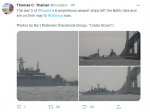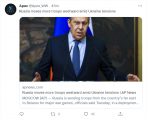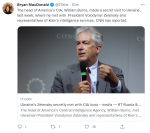Global: MilitaryInfo
@Global_Mil_Info
Russia has started a slow departure of Russian diplomats in Ukraine. Additional Russian consulates have been told to be ready to leave, according to officials to NYT.
7:17 PM · Jan 17, 2022·
Twitter for Android
Russia Thins Out Its Embassy in Ukraine, a Possible Clue to Putin’s Next Move
The slow evacuation may be part propaganda, part preparation for a conflict or part feint, Ukrainian and U.S. officials say. It could be all three.
The Russian Embassy in Kyiv, Ukraine, in April.Credit...Andrei Ratmirov/TASS via Getty Images
By
Michael Schwirtz and
David E. Sanger
Jan. 17, 2022
KYIV, Ukraine — The week before intensive diplomatic meetings began over the buildup of Russian troops on the Ukrainian border, American and Ukrainian officials watched from afar as Russia began emptying out its embassy in Kyiv, the Ukrainian capital.
On Jan. 5, 18 people — mostly the children and wives of Russian diplomats — boarded buses and embarked on a 15-hour drive home to Moscow, according to a senior Ukrainian security official.
About 30 more followed in the next few days, from Kyiv and a consulate in Lviv, in western Ukraine. Diplomats at two other Russian consulates have been told to prepare to leave Ukraine, the security official said, speaking on the condition of anonymity to discuss national security matters.
How to interpret the evacuation has become part of the mystery of divining the next play by President Vladimir V. Putin of Russia. Thinning out the Russian Embassy may be part propaganda, part preparation for a looming conflict or part feint, Ukrainian and U.S. officials say. It could be all three.
In recent days, the slow departures — which the Russians most likely knew that the Americans and the Ukrainians would see — have become part of the puzzle of what happens next. They are a more ominous data point, in addition to
cyberattacks on Ukrainian ministries last week, and reports from Microsoft and the U.S. government that far more destructive
malware has been planted in Ukrainian networks but not activated.
Enormous train convoys loaded with tanks, missiles and troops continue to push west through Russia, apparently heading for the Ukrainian border.
Aleksandr G. Lukashenko, the authoritarian leader of Belarus, announced on Monday that Russian forces and equipment had begun arriving in his country for a joint military exercise that would be held in two places: on Belarus’s western edge, near Poland and Lithuania, two NATO countries; and along the Ukrainian border, which could prove another pathway for invasion.
The exercise has been given a very American-sounding name: Allied Resolve. But in Kyiv, Ukrainian officials fully expect any Russian troops deployed to Belarus for the exercises to remain in place indefinitely, leaving Ukraine open to attack from the north, the east and the south
“We’ll be fully surrounded by equal forces,” the senior Ukrainian security official said.
In Washington, U.S. officials say they still assess that Mr. Putin has not yet made a decision to invade. They describe him as more a tactician than a grand strategist, and they believe that he is constantly weighing a host of different factors. Among them is how well he could weather the threatened sanctions on his banks and industry, and whether his demands that Ukraine stop veering toward NATO — and that NATO stop spreading toward Russia — are receiving enough attention.
But the U.S. officials say Mr. Putin may also have concluded that with the United States and other countries arming Ukraine, his military advantage is at risk of slipping away. Britain’s defense secretary, Ben Wallace, announced in an
address to Parliament on Monday that the country would begin providing Ukraine with light, anti-armor defensive weapons. Mr. Putin may become tempted to act sooner rather than later.
Editors’ Picks
Into the Belly of the Whale With Sjón
A Love of Trees or a Display of Power? The Odd Park of an Oligarch.
The Eerie, Lunar Nothingness of Namibia’s Skeleton Coast
Continue reading the main story
U.S. officials saw Russia’s embassy evacuations coming. “We have information that indicates the Russian government was preparing to evacuate their family members from the Russian Embassy in Ukraine in late December and early January,” a U.S. official said in a statement.
Ukrainian officials say they saw the Russians leave.
But that leaves open the question of what, if anything, the Russians were signaling.
It is possible they were trying to bolster the case that the United States and its Western allies should take seriously their demands that Ukraine can never join NATO, and that troops, nuclear weapons and other heavy weaponry must be removed from former Warsaw Pact states, like Poland, that were once allied with the Soviet Union.
It could also be that the Russians were trying to indicate that an attack was brewing, though there were no other signals. In fact, the buildup of Russian troops on the Ukrainian border is not increasing at a rate that Pentagon officials expected a month ago.
The latest U.S. estimates are that about 60 battalion tactical groups, known as B.T.G.s and each with an average of 800 soldiers, are now in place at the border with Ukraine. Combined with other local forces, the Russians have about 77,000 troops at the border, with more on the way. Others put the figure at closer to 100,000 — much depends on how different forces are counted — but that is well short of the Pentagon’s estimate more than a month ago that the total number could rise to 175,000.
U.S. and European intelligence and military officials say Mr. Putin may be waiting for the ground to freeze, making it easier to get heavy equipment over the border. Or he may be building up slowly, for diplomatic advantage, as he awaits a written reply from the Biden administration and NATO to his demands that they roll back NATO’s military posture to what it was 15 years ago — much farther from Russia’s borders.
While U.S. officials still believe Mr. Putin is undecided about his next move, officials in Kyiv are assessing what an attack may look like, if it happens. It could come in the form of a full-on invasion, the Ukrainian security official said. Or Russia could launch a cyberattack on the Ukrainian energy grid — far larger than the ones conducted in 2015 and 2016 — combined with military escalation in Ukraine’s east, where Russian-backed separatist forces remain deeply entrenched.
No one but the leaders in the Kremlin seem to know for sure how the next days and weeks might play out.
Against this backdrop, a senior delegation of U.S. senators arrived in Kyiv on Monday. Their trip followed a visit to Kyiv last Wednesday by the C.I.A. director, William J. Burns, who consulted with intelligence officials and met with Mr. Zelensky to discuss efforts to de-escalate tensions with Moscow, a U.S. official said. Mr. Burns’s trip was
reported earlier by CNN.
Understand the Escalating Tensions Over Ukraine
Card 1 of 5
A brewing conflict. Antagonism between Ukraine and Russia has been simmering since 2014, when the Russian military crossed into Ukrainian territory,
annexing Crimea and
whipping up a rebellion in the east. A tenuous cease-fire was reached
in 2015, but
peace has been elusive.
A spike in hostilities. Russia has recently been
building up forces near its border with Ukraine, and the Kremlin’s rhetoric toward its neighbor has hardened. Concern grew in late October, when
Ukraine used an armed drone to attack a howitzer operated by Russian-backed separatists.
Ominous warnings. Russia called the strike a destabilizing act that violated the cease-fire agreement, raising fears of a new intervention in Ukraine that could draw the United States and Europe into
a new phase of the conflict.
The Kremlin’s position. President Vladimir V. Putin of Russia, who has increasingly portrayed NATO’s eastward expansion
as an existential threat to his country, said that Moscow’s military buildup was a response to Ukraine’s deepening partnership with the alliance
Rising tension. Western countries have tried to
maintain a dialogue with Moscow. But administration officials recently warned that the
U.S. could throw its weight behind a Ukrainian insurgency should Russia invade.
The senators’ visit was a bipartisan show of support from Ukraine’s most powerful ally, even if they brought few specific proposals for staving off a Russian attack.
“Russia’s actions in eastern Ukraine and Crimea, and the actions that they are planning today, represent the most serious assault on the post-World War II order in our lifetime,” Senator Christopher S. Murphy, a Connecticut Democrat who sits on the Foreign Relations Committee, said at a news conference in Kyiv.
Russia annexed the Crimean Peninsula in 2014 and instigated a violent separatist uprising that effectively cleaved away two Ukrainian provinces. More than 13,000 people were killed in the fighting.
At the news conference, Mr. Murphy said he hoped legislation that outlines punishing sanctions against Russia’s leadership, including Mr. Putin, would reach President Biden’s desk before any Russian action and possibly help deter it. In a meeting with the senators late Monday, President Volodymyr Zelensky of Ukraine urged them to impose sanctions quickly “to counter the aggression” from Russia.
The senators’ pledges to defend democracy and vanquish tyranny seemed a throwback to the Cold War. Indeed, observers have argued that Mr. Putin’s threats against Ukraine are rooted in a desire to reconstitute a Moscow-led Eastern bloc reminiscent of Soviet times.
Similarly, Mr. Lukashenko, the Belarusian leader who is close to Mr. Putin, made his own argument that the Russians were responding to the Americans.
“What are the Americans doing here?” Mr. Lukashenko said. “There are these hotheads who are calling for war.”
It is possibly in that spirit that Russian troops will begin military exercises in Belarus next month. Security officials fear that the exercises could become a pretext for long-term deployment of Russian forces in the former Soviet republic, which shares a lengthy western border with the European Union and NATO.
Mr. Lukashenko has pledged to follow Mr. Putin’s lead on any action in Ukraine.
Julian E. Barnes contributed reporting.
Russia, Ukraine and the West
The slow evacuation may be part propaganda, part preparation for a conflict or part feint, Ukrainian and U.S. officials say. It could be all three.

www.nytimes.com

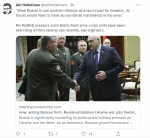
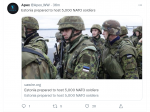

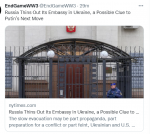


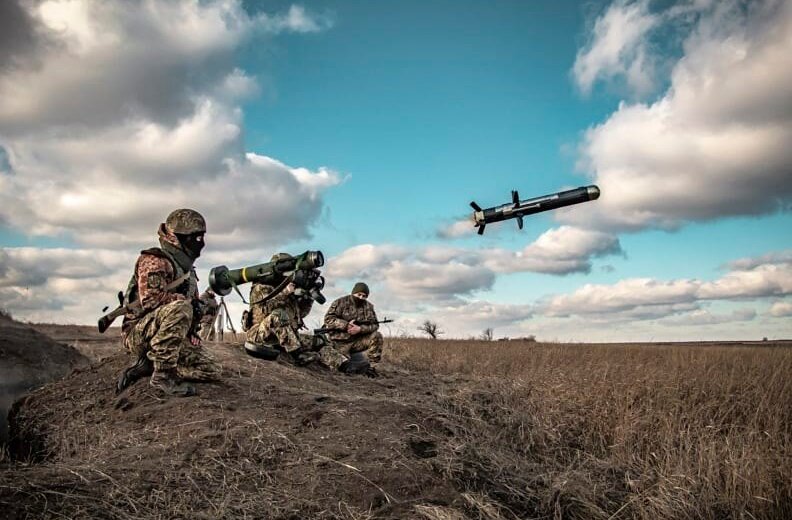
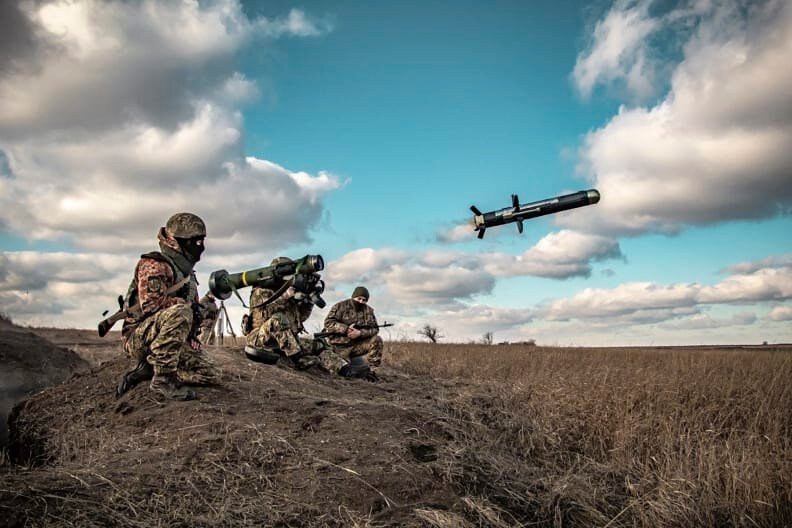
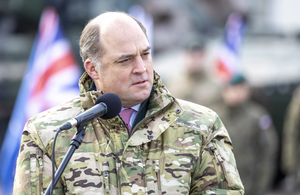
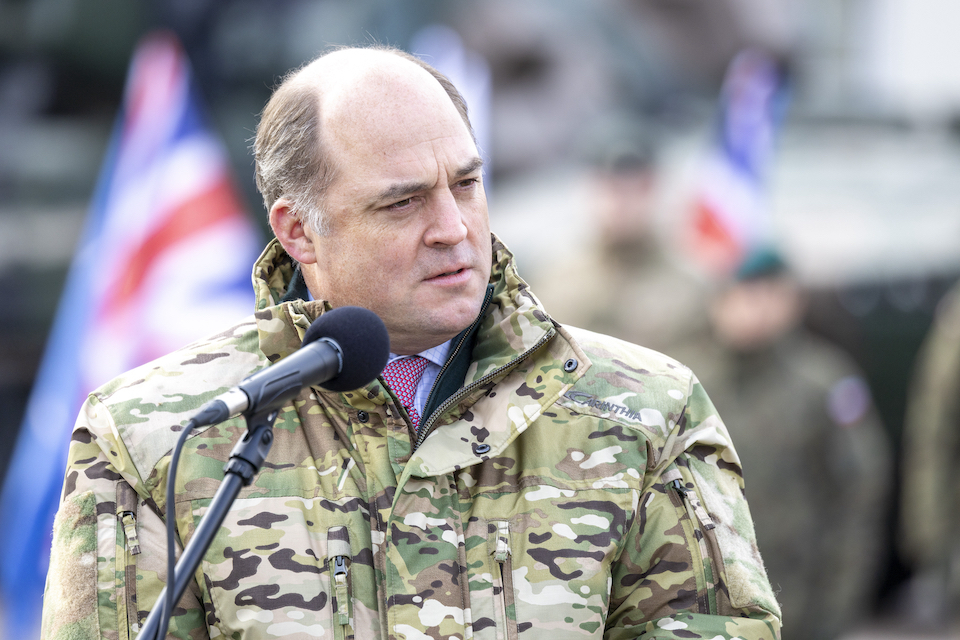
/cloudfront-us-east-2.images.arcpublishing.com/reuters/JWAIRDE76NNJDANJKYMMKZZT4A.jpg)


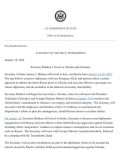
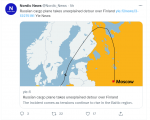
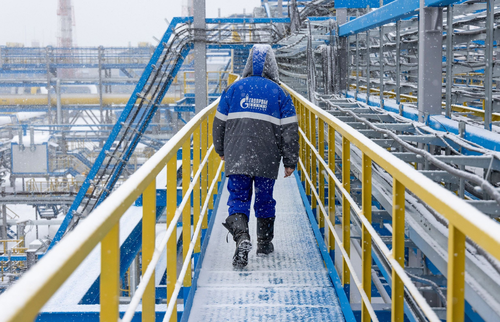 Image source: Bloomberg News
Image source: Bloomberg News